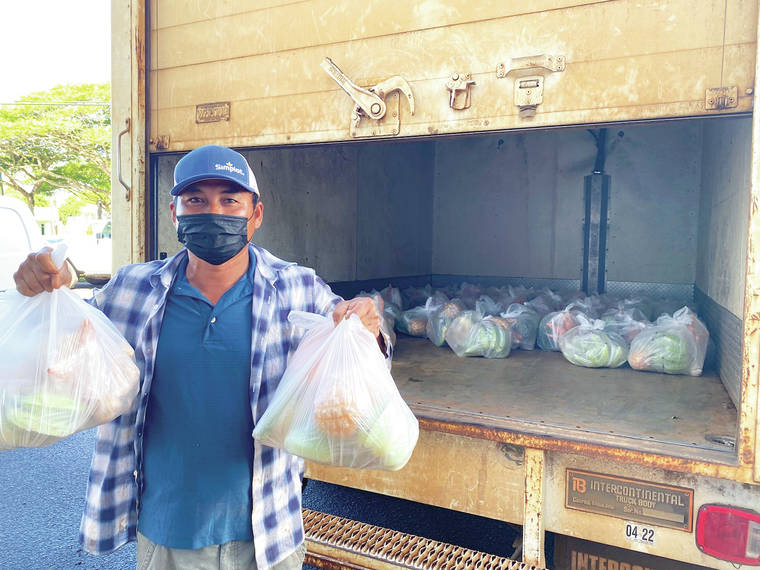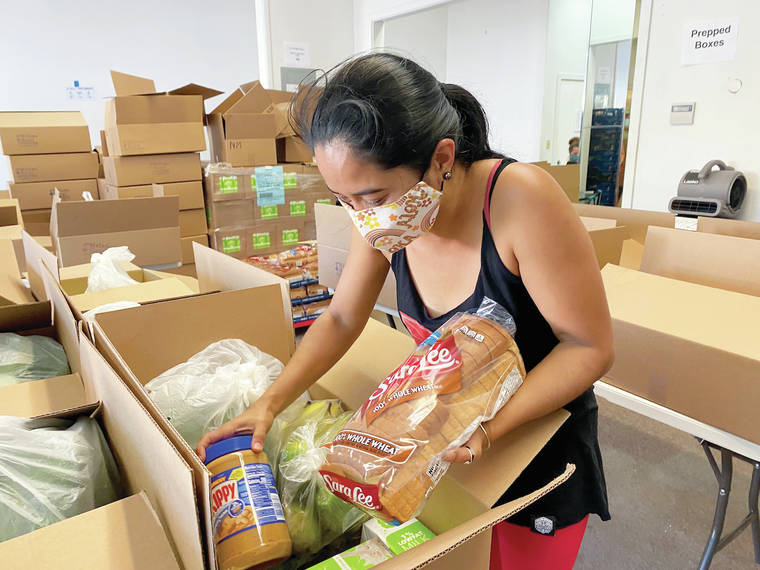$250,000 awarded in state agriculture program


LIHU‘E — This month, Malama Kaua‘i, a nonprofit in Lihu‘e, and Hawaiian Golden Farm, a remote company with farms on both Kaua‘i and O‘ahu were awarded $250,000 from the Hawai‘i Department of Agriculture to help increase commercial agricultural production.
At first, Malama Kaua‘i’s Executive Director Megan Fox said she was surprised to find out her organization was selected to receive the funds, however, it will be used to help build their new Moloa‘a ‘Aina Center — a food hub to provide processing facilities, technical assistance programming and expanded aggregation/distribution services for over 100 Kaua‘i farmers, ranchers and food producers.
Malama Kaua‘i also wants to expand value-added production for commodities grown on Kaua‘i.
“We were able to build this relationship with the Moloa‘a Irrigation Cooperative and assigned a 15-year lease last August,” Fox said. The least is $1, making it a legal contract and partnership between the group because they got money from the state to buy the land.
According to Fox, one of the parts of that lease was that they build a post-harvest facility for farmers.
“This is back in 2016,” Fox said. “And there’s no post-harvest facility. So it was like something we really wanted to do it. They needed one done. It was just a perfect match. So we’ve been working on developing that.”
Fox added and said it will be a new food hub, the largest farming cluster on Kaua‘i with 70 farms spanning 600+ acres.
Currently, Malama Kaua‘i is pumping out 1,000 meal kits for kids out of their donated office space off of Umi Street every week all summer.
“This is just a building that we found that somebody would donate to us,” Fox said. “It’s going to be demo mode, once this is over. We did over a million dollars of food last year — no facility, one refrigerated, and one van. We made it happen. So now we are looking at what we’re going to be able to do once we have our facility, and we will have a fleet of representative vehicles. It’s gonna be pretty cool. I’m really excited.”
Fox encourages families on Kaua‘i to sign up for Supplemental Nutrition Assistance Program through the Department of Human Services, because families or individuals may use it at their online store.
This year marks Malama Kaua‘i’s 15th serving Kaua‘i communities.
“From supporting the farmers together, and then giving it to people that need it,” Fox said. Whether it’s a pitfall in the deed with the DOE, or if it’s people that need consumers, if it’s people that need food because they’re on SNAP, or WIC, or if it’s people that need food, because they’re isolated due to weather catastrophes.”
Daily, Fox said there are about 40 to 50 scheduled volunteers that help them pack and deliver 1000 boxes of food across the island.
“For me, it’s like creating this sense of abundance in our community they used to have, and they had it by working together,” Fox said. “We’re doing that, again, in so many different ways, like trying to rebuild up other partners in farms. It’s everybody coming in, working together. What five people can move, you know, 1000 boxes home delivered to kids across the island?”
Anni Caporuscio said she could be working as a bookkeeper for a billionaire like she did before, however, she chooses to work for Malama Kaua‘i because it means so much more to her.
“You can you can do anything for work, right?,” Caporuscio said. “It’s true, but I feel as though I’m doing something good and better and I’m making a difference.”
Rise to Work member Taryn Moura also chose to work for Malama Kaua‘i instead of staying home and watching tv.
“The best takeaway was just remembering how much they (MK) really are offering and then educating the people who don’t understand what this is all about,” Moura said. “Wow, it’s so rewarding.”
The HDOA awarded funds to six proposals totaling $1.5 million under the Grow Hawai‘i Agriculture Initiative 2021, a program aimed at assisting established local agricultural enterprises to quickly scale up production and increasing the state’s gross domestic product.
“The program was impressed with the quality of the 45 proposals it received from diverse agricultural businesses,” Phyllis Shimabukuro-Geiser, chairperson of the Hawai‘i Board of Agriculture, said. “The proposals were awarded to businesses with proven track records of success and that have demonstrated the ability to significantly increase agricultural production and expand markets for Hawai`i-grown commodities.”
Matthew Loke, administrator of the Agricultural Development Division said the second business entity on Kaua‘i that received the award is Hawaiian Golden Farm, a farm that started in Hilo but now grows sweet potatoes in Kalepa and has a farm on O‘ahu.
“They are embarking on a new adventure on Kaua‘i,” Loke said. “In the mainland…in some areas, like in Minnesota and Wisconsin, you would have wild rice during Lent as their staple foods. In Hawai‘i it is a little bit different, our staple is going to be sweet potatoes.”
According to Hawaiian Golden Farm, their proposal consists of expanding acreage and automate farming operations and creating new value-added products for local consumption and domestic and international export. Besides Okinawan sweet potatoes, they will also grow ginger, herbs, and papaya.
Loke said the funds came from the state legislature last year.
“We are very fortunate to get the funding from the state legislature and the state is basically trying to have the agriculture industry contribute more to Hawai‘i, Hawai‘i’s gross domestic product and job growth,” Loke said. “We had a really tough year in 2020. During the pandemic, we lost a lot of jobs. A crazy year. Well, I guess in some ways, Kaua‘i was a little bit ahead of the curve.”
